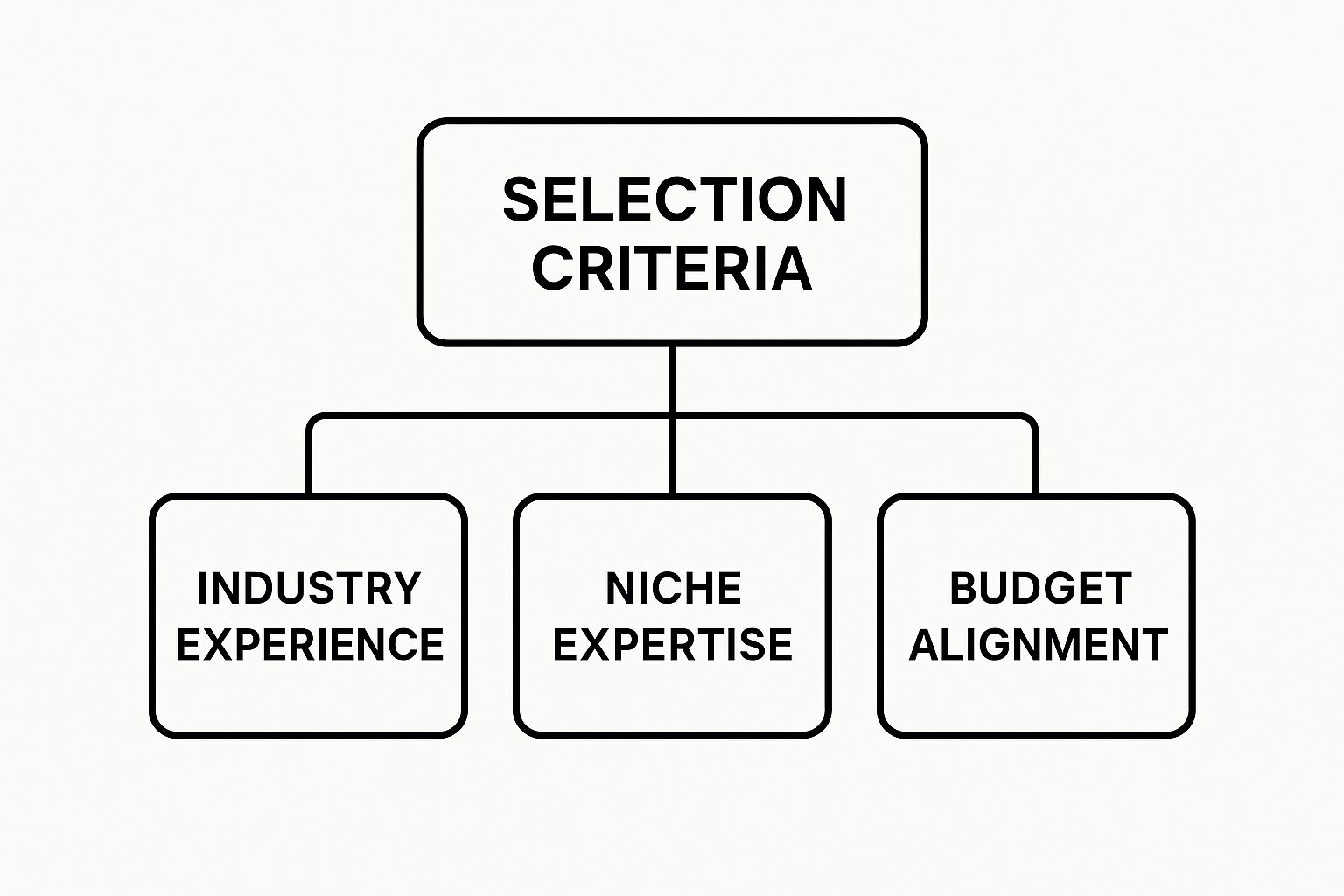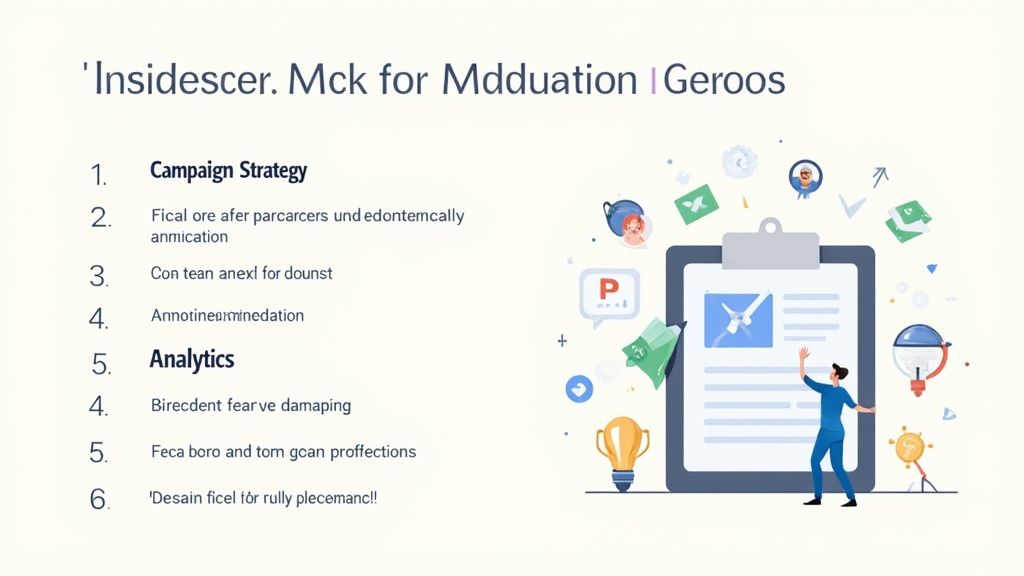
Top Influencer Marketing Agencies for Brand Growth
Published
An influencer marketing agency is your expert partner for navigating the creator economy. They manage every piece of an influencer campaign for a brand—from big-picture strategy and finding the right creators to running the campaign and reporting back on what worked. Think of them as the essential bridge connecting your company to the right influencers, handling all the complex details so you don't have to.
Defining The Modern Influencer Marketing Agency

An influencer agency is much more than a simple matchmaker. They're a campaign architect, a project manager, and a diplomat, all rolled into one. A brand could spend countless hours scrolling through social media, but an agency walks in the door with a curated network of creators and a sharp, strategic eye. Their main job is to act as that specialized go-between, lifting the immense operational weight off your marketing team.
This frees your team up to focus on core business goals instead of getting bogged down in the nitty-gritty of creator negotiations, content approvals, and performance tracking.
The real magic of an agency is its ability to translate a brand's objectives into authentic, creator-led content that actually connects with an audience. They mix deep market knowledge with creative flair to build campaigns that feel genuine, not like a sales pitch.
At the end of the day, they manage the entire lifecycle of an influencer campaign. They make sure every single step, from the first outreach to the final report, lines up perfectly with your brand's voice and business goals.
Beyond Simple Matchmaking
Top-tier influencer marketing agencies have moved far beyond just pairing brands with creators. They are now full-service strategic partners. Their value comes from a powerful mix of industry expertise, established relationships, and specialized software—resources that most in-house teams simply can't access on their own.
This kind of expert support is more important than ever. The global influencer marketing industry is exploding, projected to hit an estimated value of $32.55 billion by 2025, a huge leap from around $24 billion in 2024. This growth is no surprise when you consider that over 80% of marketers find influencer marketing to be a highly effective strategy. You can dive deeper into the market growth data to see why this is such a critical investment for brands today.
The Key Functions of an Agency
So, what does an agency actually do? Their responsibilities cover everything needed to run a smooth and high-impact campaign. Here's a look at the core functions they handle.
| Core Function | Description |
|---|---|
| Strategic Planning | They work with you to define clear campaign goals, pinpoint your target audience, and develop a creative concept that fits your brand. |
| Creator Vetting & Selection | Using powerful tools and industry experience, they find and vet influencers for authentic engagement, a brand-safe history, and the right audience. |
| Contract Negotiation & Management | They manage all the legal and financial details, including negotiating rates, content usage rights, and specific deliverables to protect your interests. |
| Campaign Execution & Reporting | From briefing creators to tracking content and measuring KPIs, the agency manages the entire process and delivers detailed reports on your campaign's ROI. |
Essentially, an agency provides a comprehensive, end-to-end service designed to take the guesswork out of influencer marketing and deliver measurable results.
The End-to-End Services Agencies Provide

A top-tier influencer marketing agency does far more than just hand you a list of potential creators. They are full-service partners, equipped to manage every single piece of a campaign puzzle, from a rough idea all the way to a report showing real business results. This complete support is what truly distinguishes a strategic agency from a simple software platform.
Think of it this way: hiring an agency is like bringing on a general contractor to build your dream home. You share your vision and budget, and they take it from there. They're the ones laying the foundation, hiring and managing all the subcontractors, and making sure every last detail is perfect. An agency plays that exact role for your marketing campaigns.
It all starts with a solid foundation: detailed strategic planning. Agencies don't just throw ideas at the wall. They get to know your brand, your audience, and your business objectives inside and out to build a data-driven campaign strategy that actually makes sense for your goals.
Strategy and Creator Curation
The first job for any agency is to architect the campaign. This is where they take your big-picture goals and turn them into a specific, actionable plan. They'll nail down the key performance indicators (KPIs), brainstorm creative concepts, and define the core messages you want to get across.
Next comes the most critical part: creator discovery and vetting. This is where a great agency really proves its worth. They go way beyond surface-level follower counts and dig deep to analyze potential partners.
- Audience Alignment: They make sure a creator's audience isn't just large, but that it's the right audience, matching your ideal customer's demographics and interests.
- Brand Safety: Agencies painstakingly review a creator's content history to spot any red flags or posts that clash with your company's values.
- Performance Metrics: They analyze past campaign data to find creators with genuine engagement, steering clear of those with fake followers or bot activity.
An agency’s ability to vet for brand safety is one of its most valuable functions. A single partnership with a misaligned creator can cause significant brand damage, a risk that agencies are specifically equipped to mitigate through rigorous screening.
Campaign Management and Legal Compliance
Once the right creators are on board, the agency switches gears into a management role, handling all the complex logistics that can easily overwhelm an in-house team. This includes negotiating every contract, which is a highly specialized skill. They secure favorable terms on deliverables, content usage rights, exclusivity, and payments, protecting you from nasty legal and financial surprises.
They also run the entire content workflow. This means briefing creators, giving constructive feedback on drafts, and making sure everything goes live on schedule across TikTok, Instagram, YouTube, and other platforms. This hands-on oversight keeps the whole campaign running like a well-oiled machine.
A crucial—and often forgotten—service is ensuring advertising compliance. Agencies are experts at navigating the ever-changing legal rules for sponsored content, like proper FTC disclosures. This protects both you and the creator from hefty fines. To keep your campaigns on the right side of the law, it’s always smart to review established influencer marketing best practices and stay current.
Performance Reporting and Optimization
The final, and arguably most important, service is measurement and reporting. When the campaign is over, an agency doesn't just email you a few vanity metrics and call it a day. They deliver transparent, comprehensive performance reports that tell the whole story.
These reports connect the dots between campaign activities and your original business goals, showing a clear return on investment (ROI). They break down what worked, what didn't, and why, giving you actionable insights you can use to make your next campaign even better. This data-driven feedback loop is what helps you refine your strategy and get the most out of every marketing dollar you spend. It’s this complete, end-to-end management that makes an agency an essential partner for any brand serious about growth.
How Modern Influencer Agencies Are Structured
To pull off the kind of complex, high-impact campaigns that get people talking, influencer marketing agencies are built like highly specialized commando units. Each person has a distinct and absolutely critical role. They aren't just a random collection of marketers; they're an integrated system designed for one thing: turning a brand's goals into authentic creator content that actually moves the needle.
It's helpful to think of it like a film crew. You've got the director with the creative vision, a producer keeping everything on budget and on schedule, a casting director finding the perfect talent, and a cinematographer making sure every shot looks brilliant. Each one is a master of their craft, but the movie only comes together when they all work in perfect harmony. An agency runs on the same principle, with each department owning a crucial piece of the campaign puzzle.
This specialized structure ensures that every detail—from the initial spark of a creative idea to the final performance report—is handled by a pro who lives and breathes that specific function. This is precisely why agencies can so often outperform a DIY approach, where one person is usually stretched thin trying to wear too many hats at once.
The Core Roles on an Agency Team
While the exact job titles might differ from one agency to the next, most successful firms are built around four key roles. These are the professionals who form the collaborative engine that drives a campaign forward, making sure nothing gets missed.
Here’s a look at the key players you'll most likely work with when you partner with an agency:
The Account Manager: Think of this person as your main point of contact and strategic guide. They’re the "producer" of your campaign, responsible for deeply understanding your business goals, managing budgets and timelines, and keeping the entire agency team aligned with your vision. They ensure the project stays on course and that you're always in the loop.
The Campaign Strategist: The creative architect of the operation. The strategist is the "director" who dreams up the core campaign concept. They dive into market research, spot emerging trends, and brainstorm innovative ways to make your brand stand out. Their job is to craft a story that will truly connect with your target audience.
The Talent Manager: Often called a Creator Relations Manager, this person is your "casting director." They are completely immersed in the creator world, with deep relationships across countless niches. They handle the critical work of discovering influencers, vetting them for brand safety, negotiating contracts, and building those all-important creator partnerships.
The Data Analyst: This is the "cinematographer" who captures the full picture of your campaign’s performance. An expert in measurement, they track key metrics, analyze the results, and turn raw data into clear, actionable insights. They are the ones who prove the campaign's ROI and give you the intelligence needed to make your next effort even better.
The image below shows some of the key criteria a talent team uses when selecting the right partners for your brand.

It’s a balancing act that requires a deep understanding of the industry, specific niche expertise, and the practical realities of a budget to find that perfect creator fit.
How These Roles Collaborate for Success
The real magic of an agency isn't just in the individual roles, but in how they work together. The Account Manager takes your business objectives and translates them for the Campaign Strategist, who then builds a creative brief. The Talent Manager uses that brief to find the perfect creators to bring the idea to life authentically.
This flow is what makes an agency partnership so powerful. Take a beauty brand launching a new foundation, for example. The strategist might pitch a campaign built around authentic "no-filter" reviews. The talent manager then goes out and finds beauty creators known for their raw, honest content. Once the content is live, the data analyst is already tracking engagement, conversions, and audience sentiment, feeding that info back to the team for potential real-time tweaks.
This seamless collaboration—a constant feedback loop between strategy, talent, and data—is what you’re really paying for.
Key Roles Within an Influencer Agency vs In-House Team
To see just how specialized agency roles are, it's useful to compare them to what a typical in-house marketing generalist might handle. While an in-house marketer is often a jack-of-all-trades, an agency provides a team of masters for each specific trade.
| Key Role/Function | Influencer Marketing Agency | Typical In-House Marketing Team |
|---|---|---|
| Strategy & Creative | Campaign Strategist develops the core concept, narrative, and creative direction based on deep industry knowledge. | A Marketing Manager or Social Media Manager develops the concept, often balancing it with many other marketing duties. |
| Talent Sourcing | A dedicated Talent Manager uses established relationships and advanced tools to discover, vet, and negotiate with creators. | The Social Media Manager or Marketing Coordinator handles outreach, which can be time-consuming without specialized tools. |
| Project Management | An Account Manager serves as the client's dedicated point of contact, managing timelines, budgets, and team alignment. | The Marketing Manager oversees the project, but it’s one of many campaigns they are likely juggling simultaneously. |
| Performance & ROI | A Data Analyst focuses solely on tracking KPIs, analyzing performance data, and creating detailed reports to prove ROI. | The Marketing Manager or an analyst who covers all marketing channels pulls the data, often with less specialized focus. |
As you can see, the agency model replaces one person trying to do everything with a dedicated expert for each critical stage of the campaign. This depth of expertise is what allows agencies to manage complexity and deliver more consistent, predictable results.
The Technology Driving Agency Success

The best influencer marketing agencies today aren't just running on good ideas and strong relationships. They're powered by a serious tech stack that gives them a massive edge. This technology isn't just a nice bonus; it’s the engine that drives everything from efficiency and precision to proving that the work actually pays off.
These tools are woven into almost every step of a campaign. They take tasks that used to be a huge, manual slog and turn them into data-driven, efficient operations. Whether it's finding that one perfect creator in a sea of millions or showing a client exactly what their return on investment was, technology is what separates the good agencies from the great ones.
You can't argue with the growth here. The market for influencer marketing platforms was valued at $25.44 billion in 2024 and is expected to explode to $97.55 billion by 2030. This incredible jump is all thanks to new developments in AI and machine learning that are making everything from creator discovery to performance tracking smarter and faster. You can explore more about the market's explosive growth to get a sense of just how big this is.
The Modern Agency Tech Stack
An agency’s tech stack is its secret weapon. While the exact tools will differ from one shop to the next, they generally cover a few key areas, each built to solve a specific problem in the influencer marketing workflow. These platforms allow agencies to work at a scale and with a level of detail that would be impossible by hand.
Here are the core tools you'll find in almost any modern agency's toolkit:
- Influencer Discovery Platforms: Think of these as super-powered search engines for people. Agencies use them to filter millions of creators by niche, audience demographics (like age, location, and interests), engagement rates, and even the visual style of their content to find the perfect fit for a brand.
- Audience Analysis Tools: This is where things get serious. These tools dig deep into a creator's audience, going way beyond simple follower counts. They can spot fake followers and bots, verify that an audience is legitimate, and make sure the people following a creator are the same people a brand wants to reach.
- Campaign Management Software: This is the mission control for every campaign. It’s where the team manages contracts, keeps track of content deadlines, handles all the back-and-forth communication, and organizes payments. It ensures no detail gets missed.
- Reporting and Analytics Dashboards: These tools are all about results. They automatically pull data from Instagram, TikTok, YouTube, and other platforms into one place, creating clear reports that track everything from reach and engagement to clicks and sales. This provides a crystal-clear picture of how a campaign performed.
Technology allows agencies to stop guessing and start making decisions backed by hard data. Instead of just hoping a creator is a good fit, they can use audience data to prove it, giving clients the confidence that their marketing dollars are being invested wisely.
AI and Machine Learning in Action
Artificial intelligence (AI) and machine learning (ML) are pushing agency capabilities to a whole new level. These systems can sift through enormous amounts of data to find patterns and make predictions that a human simply couldn't.
For instance, some of the more advanced platforms use AI to forecast how well a campaign might do before it even goes live. By looking at a creator’s past performance and audience makeup, the system can predict things like engagement rates and even potential ROI. This helps brands make much smarter decisions about where to put their money. The best agencies also use tools that help them to automate social media posts, which helps maintain a steady and timely flow of content across all the creators in a campaign.
At the end of the day, technology is the backbone of the modern influencer agency. It provides the data for smart planning, the tools for smooth execution, and the analytics to prove value. This allows agencies to deliver strategic insights that go far beyond surface-level metrics.
How to Choose the Right Agency for Your Brand
Picking an influencer marketing agency is a big deal. It's one of the most critical decisions you'll make for your brand. Get it right, and you've got a partner who can spark real growth and build genuine connections with your audience. Get it wrong, and you’re looking at a wasted budget and maybe even a hit to your reputation.
This isn't a decision you make on a gut feeling. Think of it like hiring a new executive. You wouldn't bring on a CFO without digging into their financial background, right? The same goes for an agency. You need to scrutinize their work, their process, and how they fit with your brand's culture. The goal is to find a team that gets more than just your product—they need to get you.
It’s about asking the tough questions and making sure their way of doing things aligns perfectly with your business goals.
Evaluate Their Industry Experience and Niche Expertise
First things first: does the agency have a proven track record in your specific industry? An agency that’s a rockstar at promoting mobile games probably isn't the best choice for a luxury skincare line. Niche expertise is everything because it means they already speak your customer's language and understand the market's quirks.
An agency with deep experience in your vertical brings a lot to the table:
- Established Creator Relationships: They aren't starting from square one. They’ll have a curated list of trusted creators in your niche, which saves a massive amount of time and guesswork.
- Understanding of Nuances: They know the subtle trends, consumer hang-ups, and potential landmines specific to your industry. This is how you avoid embarrassing—and costly—mistakes.
- Relevant Campaign Experience: Their case studies should feature brands that look a lot like yours. This gives you a clear picture of what success could look like for you.
Don't be shy. Ask them directly: "Can you show us three campaigns you've run for brands in the CPG food space? What were the key challenges, and what specific results did you deliver?" A confident agency will have these answers ready to go.
Analyze Their Creator Network and Vetting Process
The quality of an agency is a direct reflection of the quality of its creators. A great agency doesn't just boast about a huge network; they pride themselves on a high-quality, thoroughly vetted one. You need to get into the weeds of how they find, screen, and manage their talent.
Here are some key questions to get you started:
- What tools do you use for creator discovery and audience analysis?
- How do you screen creators for brand safety and check for past controversial posts?
- Walk me through your process for spotting follower fraud and fake engagement.
Their answers will tell you everything you need to know. Vague, hand-wavy responses are a huge red flag. A detailed, process-driven answer shows they’re serious about protecting your brand and delivering real results. When you have the right agency, you'll be well on your way to building a powerful influencer marketing strategy that truly makes a difference.
Demand Transparency in Case Studies and ROI Measurement
Past performance is the best indicator of future success. Don't get distracted by a flashy client list on their homepage; ask to see detailed case studies with cold, hard numbers. A truly great agency will be open about both their wins and their losses—it shows they’re confident and always learning. When you look at their past work, what you're really doing is seeing if they can build a social media strategy that actually drives results for businesses like yours.
A solid case study should always include these three things:
- Clear Objectives: What was the brand trying to achieve? (e.g., increase online sales by 15%, drive 50,000 app downloads).
- Detailed Strategy: What was the core idea behind the campaign, and why were those specific creators chosen?
- Measurable Results: What were the final numbers? Look for KPIs on engagement, conversions, reach, and the holy grail: return on investment (ROI).
If an agency can’t clearly explain how they measure and report on ROI, they aren't the partner for a brand that cares about the bottom line. Finding the right agency takes some legwork, but putting in the time upfront will pay off in a big way.
Agency Partnership vs Building an In-House Team
One of the biggest forks in the road for any brand is deciding whether to work with an influencer marketing agency or build an entire team from scratch. There's no single right answer. The best path forward really boils down to your company's resources, your long-term vision, and where you are in your growth journey.
Think of partnering with an agency like plugging into a ready-made command center. You instantly get a team of specialists, established relationships with creators, and access to powerful software—all without the massive upfront cost and time sink of hiring. It's a way to get moving fast with people who have already put in the hours and climbed the steep learning curve.
On the other hand, building an in-house team is more like planting an orchard. It's a long-term play that gives you unparalleled brand immersion and direct control over every single detail. But it’s a serious commitment. You're on the hook for finding and hiring the right people, paying for expensive tools, and building all your systems from the ground up.
When an Agency Makes the Most Sense
For many brands, especially those just starting or looking to scale quickly, teaming up with an agency is the most practical choice. This approach really shines in a few common situations.
- You Need Specialized Skills—Yesterday: If your team isn't full of experts in creator vetting, contract law, and performance analytics, an agency drops a team of seasoned pros right into your lap. These are people who do this stuff all day, every day.
- You're Thinking About Scale: Agencies are built for this. They can manage campaigns with dozens or even hundreds of creators at once, a workload that would completely swamp a small internal team. They can also ramp up or dial back campaigns on a dime.
- You Want to Keep Overhead Low: An in-house team means salaries, benefits, and hefty software subscription fees. An agency rolls all of that into a single, predictable retainer or project fee.
The real magic of an agency is its ability to deliver sophisticated campaigns without all the internal operational headaches. They handle the nitty-gritty, freeing up your team to focus on the big picture.
When Building In-House Is the Right Play
While agencies offer speed and specialized talent, building your own team can be a game-changer for brands that have the resources and a specific, long-term vision.
This route is often a great fit for more established companies that see influencer marketing as a permanent, core part of their strategy. Growing this capability internally creates a team that is completely steeped in your brand’s voice and mission. Of course, this means you need to know who to hire. You can get a better feel for the specific influencer marketing agency jobs that make up a high-performing team to guide your recruitment.
In the end, the choice isn't really about which option is "better" in a vacuum. It’s about what’s the smartest fit for your brand, right here, right now.
Got Questions About Influencer Agencies? We've Got Answers.
Stepping into the world of influencer marketing agencies can feel a little confusing at first. Let's clear things up by tackling some of the most common questions people ask.
How Do Influencer Agencies Actually Charge for Their Work?
There's no single price tag for agency services. Instead, their pricing models are built to fit different needs, whether you're looking for a long-term partner or just help with a one-time project.
Here are the usual suspects:
- Monthly Retainer: Think of this like a subscription for expertise. You pay a set fee every month for ongoing work. It’s perfect for brands who want to build a consistent, always-on influencer program.
- Commission-Based: In this model, the agency takes a slice of the pie—usually a percentage of your total campaign budget. Their earnings are directly tied to how much you invest in your creators.
- Per-Campaign Flat Fee: This is straightforward. You agree on one fixed price for a specific campaign, like a product launch or a holiday push. It's clean, simple, and great for project-based work.
Agency vs. Software: What's the Real Difference?
This is a big one, and getting it right is crucial. It’s like the difference between hiring a personal chef and buying a meal-kit subscription. Both get you a meal, but the experience and effort required are worlds apart.
An agency is your strategic partner, handling the heavy lifting from start to finish. A software platform is a powerful tool that you or your team use to do the work yourselves. The best choice really hinges on your team's time, resources, and in-house expertise.
An influencer marketing agency is a full-service team of experts. They're in the trenches with you, crafting strategy, finding and vetting creators, handling negotiations, and delivering reports. On the flip side, a DIY software platform gives you access to creator databases and campaign tools, but your team drives the entire process.
How Do Agencies Make Sure Creators Are a Safe Bet for My Brand?
Protecting your brand’s reputation is an agency’s top priority. Any agency worth its salt has a serious, multi-layered process for vetting every single creator before they ever get near your campaign.
Their screening process is incredibly thorough and usually includes:
- Tech-Powered Scans: They use sophisticated tools to comb through a creator’s entire history, flagging any risky keywords, questionable images, or past affiliations that don't align with your brand.
- Human Vetting: A real person—usually a talent manager—manually reviews the creator’s profiles. They're looking for subtle red flags in tone, comment sections, and the overall vibe of their content.
- Audience Integrity Audits: They run the numbers to spot fake followers, bot activity, and other signs of low-quality engagement. This guarantees you're paying to reach real, engaged humans.
This isn't just a quick glance. It's a deep-dive investigation to ensure every creator is a brand-safe, perfect-fit partner before any contracts are even drafted.
Ready to find your place in the fast-growing world of influencer marketing? At Influencer Marketing Jobs, we connect talented professionals with top opportunities at leading agencies and brands. Explore the latest job openings and take the next step in your career today!